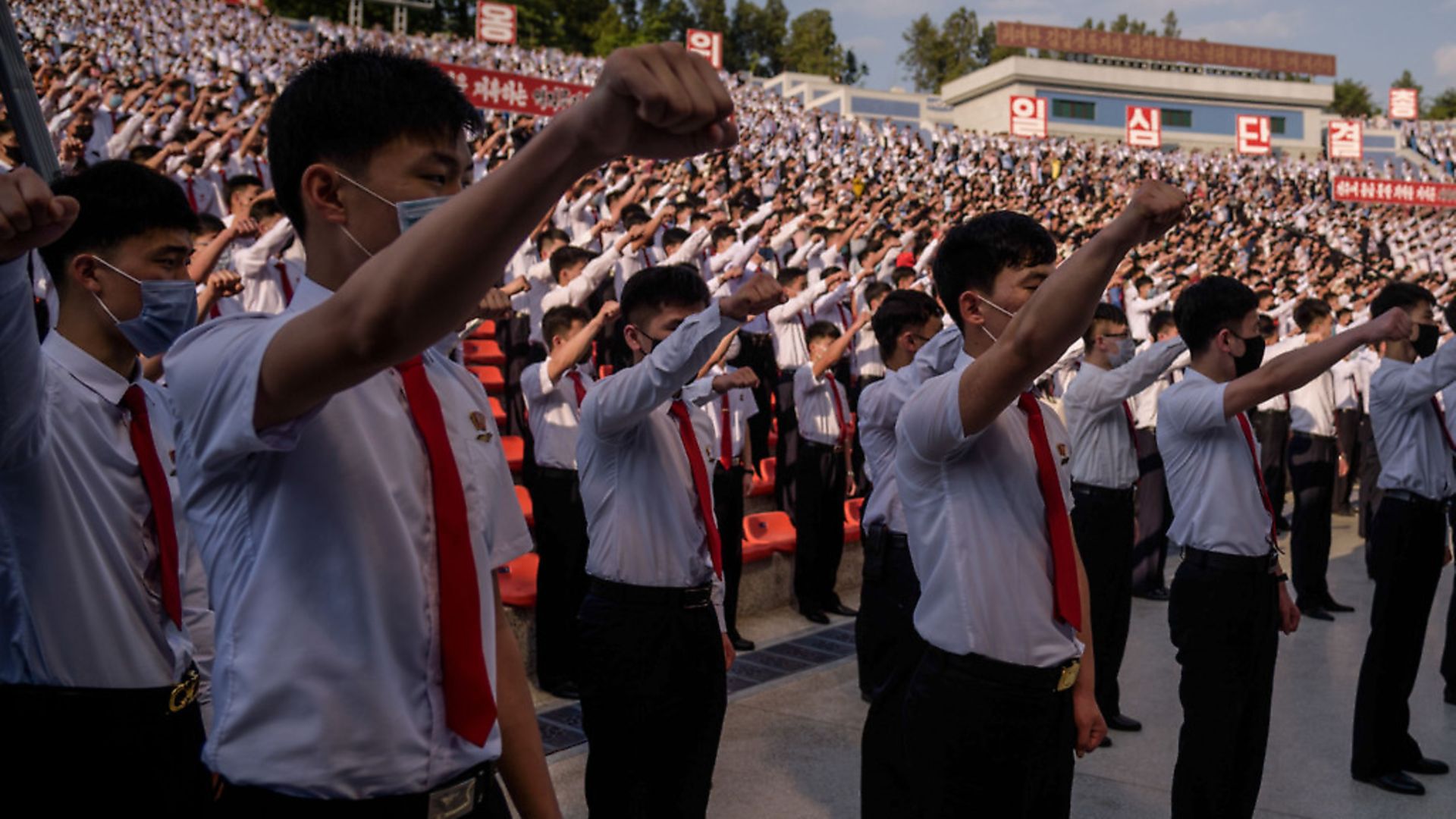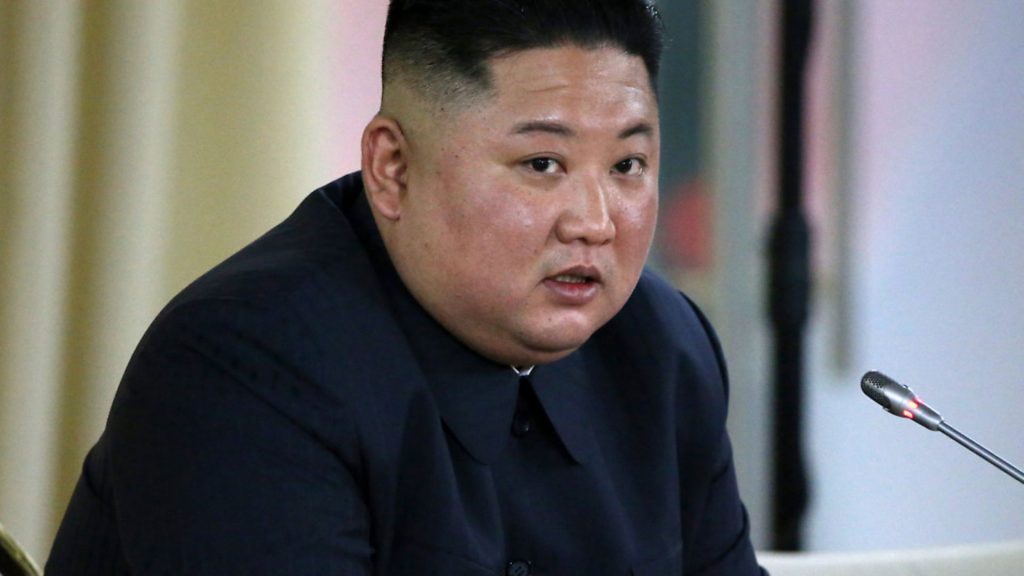
Before the arrival of the coronavirus, the world was focused on the threat posed by North Korea. That threat hasn’t diminished, because of the virus, says PAUL KNOTT. In fact, it may just have increased.

‘They’ve not gone away, you know’ Sinn Fein leader Gerry Adams once notoriously said of his violent IRA comrades when he felt Irish republican demands were being ignored. The same sentiment could be applied to North Korea’s nuclear weapons programme, an acute threat that was exercising the world before we became consumed by the Covid-19 crisis, racism and the depravity of the Trump administration.
After a period of relative quiet, supreme leader Kim Jong-un is again rattling his atomic sabre to attract global attention. He recently cut off the direct hotlines with the South Korea government, which the two sides used to speak daily and moderate the tensions between them. Announcing the termination of contact with the South, Kim said ‘the DPRK has been angered by the treacherous and cunning behaviour of the South Korean authorities with whom we still have lots of accounts to settle’ before adding ominously that ‘this measure is only the first step’.
The ostensible cause of Kim’s ire is South Korean citizens floating anti-North Korean regime information over the border attached to balloons. He contends that his counterparts in Seoul are not doing enough to stop them. But this long-running campaign by southern activists reaches very few people in the north. It hardly seems sufficient grounds for ramping-up the tension between the two neighbours now.
Rather, Kim Jong-un’s actions could be the latest instalment in a familiar pattern of North Korean behaviour. The regime habitually goes quiet when it wishes to focus on domestic issues or buy time to advance its nuclear weapons capability, then provokes a crisis when it wants something from the outside world.
Covid-19 may be the cause of that need this time. The North Koreans have implausibly claimed to be unaffected by the virus, despite their proximity to the pandemic’s original epicentre in China, the only country with which it has significant exchanges of people.
Successive heads of the Kim dynasty have rarely cared much about the death and suffering of North Korea’s ordinary citizens. During the horrific famine in the 1990s, Kim Jong-un’s father and predecessor, Kim Jong-il, continued to live lavishly and divert a huge proportion of the national budget to his nuclear programme, rather than buy urgently needed food imports for his people. But there are credible reports emerging from North Korea that the armed forces are being significantly impacted by Covid – which is another matter.
Back in March, the commander of the US forces in South Korea, Robert Abrams, said he was ‘fairly certain’ the North Korean military had been impacted because it had ‘fundamentally been on lockdown for about 30 days’. The regime is known to have discreetly solicited support from the World Health Organisation and the Doctors Without Borders NGO, as well as Russian and South Korean civil society organisations. If North Korea and its armed forces have been hit by the coronavirus, it is unlikely that the country’s inadequate medical infrastructure has been able to cope well with the problem.
Another near certainty is that the Pyongyang regime’s already precarious economy is being damaged by the sharp Covid-instigated economic downturn in China, with which North Korea does 90% of its international trade.
These reasons alone would be enough for North Korea’s rulers to return to brinkmanship, with the objective of eliciting assistance from China, which wants the regime to survive, and extorting support from South Korea, which wants to lower the threat posed to it by Pyongyang. It is possible that the ruthless Kim has identified greater opportunities from the current crisis too.
North Korea sees the United States as its ultimate adversary and obstacle to its aim of dominating South Korea. The supreme leader will have noted president Trump’s calamitous performance over recent months and declining chances of re-election later this year.
Kim has previously treated Trump like a gullible punter in one of the latter’s now bankrupt casinos. The next six months might represent his last chance to rinse Trump one more time and cash in his chips before a more astute US administration is elected.
Kim’s earlier posing of vividly expressed threats drew Trump into taking part in three unprecedented summits with him in 2018 and 2019. Kim extracted maximum benefit from these events whilst conceding little or nothing of consequence in return.
He used the international media circus surrounding the summits to upgrade his image from being the bizarre and brutal dictator of a small, impoverished nation to recognition as a world statesman on a par with the president of the most powerful country on earth.
Countries that were already lukewarm about the tough international sanctions on North Korea, notably China, took the US’s rapprochement with Pyongyang as a signal to ease implementation of them. Looser sanctions are of enormous financial benefit to the North’s ruling elite.
Perhaps most dangerously of all, and contrary to the US president’s bluster about the nuclear issue being ‘solved’, North Korea has significantly enhanced its nuclear weapons capability during Trump’s term in office.
In 2018, Kim claimed that North Korea had ‘verified completion of its nuclear weapons’. The North Koreans are continuing to perfect them by enriching uranium, expanding their long-range missile bases, building new ballistic missiles and generally upgrading their nuclear weapons-related facilities. As a result, Kim now possesses a credible arsenal with which to threaten his neighbours, particularly South Korea and Japan, and even the USA itself.
With Trump now in a desperate position domestically, Kim may be ramping up the tension in pursuit of his next big objective – to weaken the US military support for South Korea.
Trump has already mused repeatedly about withdrawing US forces from the Korean peninsula as part of his ‘America First’ agenda, in apparent ignorance of his country’s interests as a global trading and military superpower in preserving security in Asia.
Kim has already learned that a combination of aggressive provocations and occasional emollience can advance his aims, preserve his regime’s relevance and ensure his personal survival. He may well be betting that Trump will not want the failure of his previous ill-considered diplomacy highlighted during his re-election campaign and be ripe for pressuring into further concessions in order to buy quiet from North Korea.
That would be a risky gamble by Kim. The irredeemably reckless Trump is just as likely to decide that a conflict to distract attention from his many other failures is exactly what he needs.
Averting a disaster of that nature will require some deft diplomacy by the other parties with a strong stake in preventing it. Japan and South Korea should discreetly make clear to North Korea that they are prepared to ramp up the projection of the pro-freedom and democracy propaganda into the country that Pyongyang finds so troubling. They should also outline substantial plans to enhance their own military defence. Most of all, they should work with other influential global and Asian nations to encourage China to do everything it can to rein in Pyongyang.
This scenario is complicated by the scratchy relations between Tokyo, Seoul and Beijing. China might also relish the US being put in a difficult position, given their own increasingly adversarial relationship.
The North Korean threat had largely disappeared from view over the past year. But we may now be in for a dangerous period of being reminded that it is certainly has not gone away.









